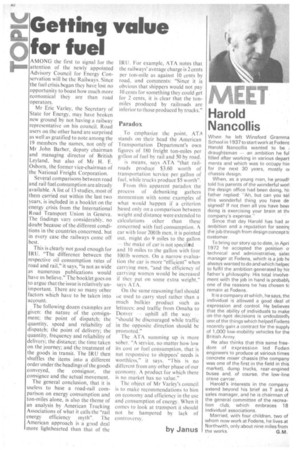Getting value for fuel
Page 44

If you've noticed an error in this article please click here to report it so we can fix it.
AMONG the first to signal for the attention of the newly appointed Advisory Council for Energy Conservation will be the Railways. Since the fuel crisis, began they have lost no opportunity to boast how much more economical they are than road operators.
• Mr Eric Varley, the Secretary of State for Energy. may have broken new ground by not having a railway representative on his council. Road users on the other hand are surprised as well as gratified to note among the 19 members the names, not only of Mr John Barber, deputy chairman and managing director of British Leyland, but also of Mr H. E. Osborn, the former vice-chairman of the National Freight Corporation.
Several comparisons between road and rail fuel consumption are already available. A list of 13 studies, most of them carried out within the last two years, is included in a booklet on the energy crisis from the International Road Transport Union in Geneva. The findings vary considerably, no doubt.because of the different conditions in the countries concerned, but in every case the railways come off best.
This is clearly not good enough for IRU. "The difference between the respective oil consumption rates of road and rail," it says, "is not as wide as numerous publications would have us believe." The booklet goes on to argue that the issue is relatively unimportant. There are so many other factors which have to be taken into account.
The following dozen examples are given: the nature of the consignment; the point of dispatch; the quantity, speed and reliability of dispatch; the point of delivery; the quantity, frequency and reliability of delivery; the distance: the time taken on the journey; and the treatment of the goods in transit. The 1RU then shuffles the items into a different order under the headings of the goods conveyed, the consignor, the consignee and the actual movement.
The general conclusion, that it is useless to base a road-rail comparison on energy consumption and ton-miles alone, is also the theme of an analysis by American Trucking Associations of what it calls the "rail energy efficiency .myth". The American approach is a good deal more lighthearted than that of the I RU. For example, ATA notes that the railways' average charge is 2 cents per ton-mile as against 10 cents by road, and comments: "Since it is obvious that shippers would not pay 10 cents for something they could get for 2 cents, it is clear that the tonmiles produced by railroads are inferior to those produced by trucks."
Paradox
To emphasize the point. ATA stands on their head the American Transportation Department's own figures of 180 freight ton-miles per gallon of fuel by rail and 50 by road. is means, says ATA "that railroads produce $3.60 worth of transportation 'service per gallon of fuel, while trucks produce $5 worth".
From this apparent paradox the process of debunking gathers momentum with some examples of what would happen if a criterion based only on a comparison between weight and distance were extended to calculations other than these concerned with fuel consumption. A car with four 200 lb men, it is pointed out, might do 9 miles to the gallon — the make of ear is not specifict and 10 miles to the gallon with four 100 lb women. On a narrow evaluation the car is more "efficient" when carrying men, "and the efficiency of carrying women would be increased if they put on some extra weight," says ATA.
On the same reasoning fuel should Ue used to carry steel rather, than a much bulkier product such as lettuces; and traffic from Omaha to Denver uphill all the way "should he discouraged while traffic in the opposite direction should be promoted."
The ATA summing up is more sober. "A service, no matter how low its cost or fuel consumption, that is not responsive to shippers' needs is worthless," it says. "This is no different from any other phase of our economy. A product for which there is no market has no value."
The object of Mr Varley's council is to make recommendations to him on economy and efficiency in the use and consumption of energy. When it comes to look at transport it should not be hampered by lack of controversy.
by Janus






























































































